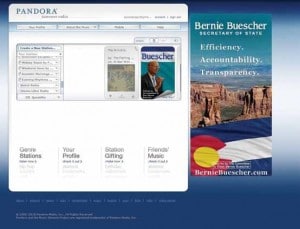Cutting Through the Clutter: Pandora Internet Radio Delivers Ads Direct to Users
June 10, 2011
 By Rick Ridder and Kevin Herman For Campaigns & Elections Magazine – Down-ballot races always face an uphill battle. When it comes to fundraising, increasing name identification, attracting earned media, and generating buzz around the campaign, the better-known “front-runners” tend to steal the limelight. This was certainly the case for Bernie Buescher, the 2010 Democratic candidate for Colorado secretary of state.
By Rick Ridder and Kevin Herman For Campaigns & Elections Magazine – Down-ballot races always face an uphill battle. When it comes to fundraising, increasing name identification, attracting earned media, and generating buzz around the campaign, the better-known “front-runners” tend to steal the limelight. This was certainly the case for Bernie Buescher, the 2010 Democratic candidate for Colorado secretary of state.
Although Buescher was technically the incumbent, he was relatively unknown, having been appointed to the post in December 2008. Fundraising for Buescher’s campaign was particularly difficult. Colorado felt the same economic pinch as the rest of the country, plus we were competing for dollars with the fundraising operations of a highly competitive U.S. Senate race. From the beginning, we knew we would need to be creative with our dollars.
Television, mail, and billboards were out of the question due to their prohibitive cost. Using online media exclusively would mean failing to reach rural Coloradans. The campaign ultimately decided radio would be the best, most cost-effective major messaging vehicle to use if we wanted to dominate a single medium.
Still, a statewide radio buy could not meet all of the campaign’s needs. The expensive Denver media market has a large number of radio stations and no dominant station for our target audience. Our initial budget allocated significant funds for online ads to target the twenty-five-to-forty-five age demographic. However, the large amount of other political advertising on Facebook, Google, and publication websites simultaneously drove up the price of these spaces and reduced their influence.
Why burn money on Google, we reasoned, when we had no hope of competing with the budgets of the gubernatorial, U.S. Senate, and state treasurer races—not to mention the funding that outside organizations were funneling toward negative ads for those campaigns?
We needed to find a way to communicate our message while increasing name identification at the same time. We needed earned media to generate some buzz around the campaign. We needed to break through the clutter of political ads being run for top-of-the-ticket races. In short, we needed to experiment with something new that was still quantifiable. In the end, we found a medium that did all of this and more: Pandora Internet radio, a website that allows its users to create individualized radio stations based on their affinity for a given song, artist, or genre. A user’s interaction with Pandora dictates which songs their radio station plays. Most Pandora listeners are young professionals who listen throughout their workday, a group that fit our target demographic perfectly.
Similar to Facebook, advertisers on Pandora benefit from the information the website gathers from users when they sign up. Ads can be targeted by gender, age, zip code, even musical genre, in order to maximize the buy. Unlike Facebook, though, there are no competing ads on the page, political or otherwise. Ads on Pandora tile the page around the music player with your artwork, so there is nothing for the user to explore other than your information. As a result, a Pandora ad draws the user’s attention as an ad on no other website can.
Pandora also has the ability to target an audience it knows is paying attention. Impressions occur when a user interacts with the player by rating a song or changing the station. Therefore, money isn’t lost on an impression that the user does not actually watch.
Great, but how do you reach users who leave the player up while they work and don’t interact with it all day? If there were no way to do this, we wouldn’t have included Pandora in our budget. Fortunately, the service solves this problem by including periodic ads between songs. Our buy included a fifteen-second spot that would play twice per hour to our target audience. This audio component allowed us to add messaging to name identification, while making sure each impression really reached the Pandora user. Additionally, it complemented our biggest ad buy: radio.
To read the full Campaigns & Elections article, click here.
Rick Ridder is president and co-founder of RBI Strategies and Research, a Denver-based political consulting and public affairs firm. Kevin Herman is a partner and director of strategic services at Albatross Digital, a strategic Web development and design firm specializing in political, government, and non-profit Web presences.
